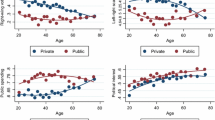Abstract
Studies of political shirking have disagreed both over whether the voting behavior of Members of Congress changes in their last term, and over the manner in which last term shirking can be controlled: through electoral sorting, or through a pension system. This paper presents evidence that Members of Congress who leave the House to run for statewide office do alter their voting behavior between the two sessions of their last House term, and that this change includes an ideological shift toward their state party delegations. The results suggest that a party-driven pension system influences the voting of House members who aspire to higher office, but that the pension system is not sufficient to control the last term shirking likely to occur if term limitations were imposed on House members.
Similar content being viewed by others
References
Barro, R.J. (1973). The control of politicians: An economic model.Public Choice 14 (Spring): 19–42.
Becker, G.S. and Stigler, G.J. (1974). Law enforcement, malfeasance, and compensation of enforcers.The Journal of Legal Studies 3(1) (January): 1–18.
Bender, B. (1991). The influence of ideology on congressional voting.Economic Inquiry 29: 416–428.
Davis, M.L. and Porter, P.K. (1989). A test for pure or apparent ideology in congressional voting.Public Choice 60(2): 101–111.
Dougan, W.R. and Munger, M.C. (1989). The rationality of ideology.Journal of Law and Economics 32: 119–142.
Fenno, R.F. Jr. (1978).Home style. Boston: Little Brown.
Ferejohn, J. (1986). Incumbent performance and electoral control.Public Choice 50: 5–25.
Higgs, R. (1989). Do legislators' votes reflect constituency preference? A simple way to evaluate the Senate.Public Choice 63(2) (November): 175–181.
Inter-University Consortium for Political and Social Research (Fall 1987). Roster of U.S. congressional officeholders and biographical characteristics of members of the U.S. Congress, 1789–1987. (ICPSR 7803).
Kalt, J.P. and Zupan, M.A. (1990). The apparent ideological behavior of legislators: Testing for principal-agent slack in political institutions.Journal of Law and Economics 33(1) (April): 103–131.
Kau, J.B. and Rubin, P.H. (1979). Self-interest, ideology, and logrolling in congressional voting.Journal of Law and Economics 22: 365–384.
Kiewiet, D.R. and McCubbins, M.D. (1991).The logic of delegation: Congressional parties and the appropriations process. Chicago: University of Chicago Press.
Kreps, D.M. and Wilson, R. (1982). Sequential equilibria.Econometrica 50: 863–894.
Lott, J.R., Jr. (1987). Political cheating.Public Choice 52(2): 169–186.
Lott, J.R., Jr. (1990a). Attendance rates, political shirking, and the effect of post-elective office employment.Economic Inquiry 28 (January): 133–150.
Lott, J.R., Jr. (1990b). Why opportunistic behavior in political markets tends to be self-correcting: An explanation for why senators from the same state vote so differently. Business Economics Working Paper #90-15 (July).
Lott, J.R., Jr. and Reed, W.R. (1989). Shirking and sorting in a political market with finite-lived politicians.Public Choice 61(1) (April): 75–96.
Lott, J.R., Jr. and Davis, M.L. (1992). A critical review and extension of the political shirking literature.Public Choice 74(4): 461–484.
Madison, James (1961). Federalist #10. In A. Hamilton, J. Madison, and J. Jay,The Federalist. New York: Signet.
McArthur, J. (1990). Congressional attendance and political shirking in lame duck sessions. Unpublished draft (May).
Ordeshook, P.C. (1986).Game theory and political theory: An introduction. New York: Cambridge University Press.
Peltzman, S. (1984). Constituent interest and congressional voting.Journal of Law and Economics 27: 181–210.
Pitkin, H.F. (1967).The concept of representation. Berkeley: University of California Press.
Poole, K.T. and Rosenthal, H. (1985). A spatial model for legislative roll call analysis.American Journal of Political Science 29(2): 357–384.
Poole, K.T. and Rosenthal, H. (1988). Patterns of congressional voting. GSIA Working Paper #88-89-07.
Schlesinger, J.A. (1966).Ambition and politics: Political careers in the United States. Chicago: Rand McNally.
VanBeek, J.R. (1990). Does the decision to retire increase the amount of political shirking? Unpublished Draft (18 August).
Zupan, M.A. (1990). The last period problem in politics: Do congressional representatives not subject to a reelection constraint alter their voting behavior?Public Choice 65(2) (May) 167–180.
Author information
Authors and Affiliations
Additional information
The author wishes to thank Jonathan Katz, John Lott, Jr., Keith Poole, Michael O'Hagan, and especially Gary Cox, for assistance and constructive criticism in preparing this paper. All short-comings were provided by the author.
Rights and permissions
About this article
Cite this article
Carey, J. Political shirking and the last term problem: Evidence for a party-administered pension system. Public Choice 81, 1–22 (1994). https://doi.org/10.1007/BF01053263
Accepted:
Issue Date:
DOI: https://doi.org/10.1007/BF01053263




